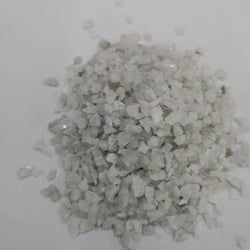Resin Sand - Product
Resin Sand is a specialized material used in various industrial applications, particularly in foundry and casting processes. It consists of sand coated with a resin binder, which provides enhanced strength, durability, and stability compared to conventional sand. This material is widely utilized in the production of high-quality castings, molds, and cores, where precise control over the casting process and finished product is required.
- Product Category: Abrasive & Material
- Key Features:
- Resin Coating: The sand is coated with a resin binder, which improves the sand’s strength and stability, making it suitable for demanding casting processes.
- High Strength: Offers superior mechanical strength and resistance to deformation, ensuring that molds and cores maintain their shape during the casting process.
- Thermal Stability: Capable of withstanding high temperatures without significant degradation, making it ideal for high-temperature casting applications.
- Consistency: Provides consistent performance and quality in casting, reducing defects and ensuring high-quality finished products.
Applications:
Foundry Casting: Used in foundries to produce molds and cores for metal casting, where its strength and thermal stability ensure precise and reliable casting results.
Core Production: Employed in the manufacture of cores for complex castings, providing the necessary strength and stability to maintain core integrity during casting.
Mold Making: Applied in mold making for various materials, including metals and plastics, to achieve high-quality molds with precise dimensions and surface finishes.
Industrial Prototyping: Utilized in rapid prototyping and small-batch production for creating high-quality prototypes and components.
Technical Specifications:
Material Composition: Sand coated with a resin binder (varies depending on the specific resin used, such as phenolic, furan, or urethane resins)
Sand Type: Typically fine to medium-grain sand, depending on the application requirements
Resin Type: Various resin types can be used, including phenolic, furan, or urethane resins, tailored to specific casting needs
Temperature Resistance: Capable of withstanding temperatures up to 1000°C or higher, depending on the resin used
Strength: Provides high compressive and tensile strength, ensuring mold and core stability
Advantages:
Enhanced Strength: The resin coating provides increased strength and stability, reducing the risk of mold or core deformation during the casting process.
Thermal Stability: Maintains performance and integrity at high temperatures, suitable for demanding casting applications.
Consistent Quality: Ensures consistent performance and high-quality results, reducing defects and improving the overall quality of castings.
Versatility: Suitable for a wide range of casting and molding applications, including metals, plastics, and industrial prototypes.
Packaging:
Available in various forms, including rolls, sheets, or custom sizes based on customer specifications. Packaging options include protective wrapping to prevent damage during transit.Storage:
Store in a dry, cool place away from direct sunlight and moisture. Ensure containers are tightly sealed to prevent contamination and maintain the effectiveness of the resin-coated sand.
You May Also Like
Provide more details here.
Use text and images to tell your company’s story. Explain what makes your product or service extraordinary.


Provide more details here.
Use text and images to tell your company’s story. Explain what makes your product or service extraordinary.







